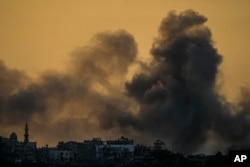As the humanitarian crisis in the Gaza Strip spirals, Israel is preparing a full-scale ground invasion of the enclave of 2.1 million Palestinians.
Analyzing the 2014 Gaza War, the last time Israel invaded the strip, could give a window into how the coming days and weeks will play out. Israeli Prime Minister Benjamin Netanyahu has vowed this time to “crush” Hamas’ leadership in Gaza. But experts say winning this battle will be far more complex than in 2014.
What happened in the 2014 Gaza War?
Hamas abducted and murdered three Israeli teenagers in 2014. Two Israelis then kidnapped a Palestinian teenager and slaughtered him in retaliation. Mass demonstrations broke out on both sides.
In the upheaval, Hamas and other Palestinian militant groups began lobbing thousands of rockets into southern Israel. More than 730 were intercepted by the Iron Dome, Israel's state-of-the-art air defense system.
Israel bombarded Gaza with missiles in response. Entire city blocks were razed. More than 1,460 Palestinian civilians are believed to have died compared to a handful of Israelis, according to UNRWA, the United Nations Relief and Works Agency for Palestinian refugees.
The Israel Defense Forces, or IDF, launched a ground invasion of the strip on Aug. 7, 2014, with the goal of destroying Hamas' widespread network of underground tunnels that were being used to stow rockets.
In the end, the IDF demolished nearly three dozen Hamas tunnels, hampering the group's ability to carry out large-scale terrorist attacks — at least until Oct. 7, 2023, when Hamas unleashed the bloodiest single-day massacre of Jews since the Holocaust, killing upwards of 1,400 Israelis.
The violence of the 2014 war spanned 50 days, until Israel and Gaza agreed to a cease-fire on August 26 of that year. Today, in fewer than two weeks of battle, more Palestinian and Israeli civilians have perished than in all the fighting in 2014.
The IDF is now planning a ground invasion dwarfing that of 2014. Netanyahu and his unity government are looking to capture Gaza City and end Hamas' brutal reign of the strip. More than 300,000 Israeli reservists have been called up.
How the coming invasion compares to 2014
"This ground invasion is intended to be far larger in scale," said Tahani Mustafa, the Palestine analyst at the International Crisis Group. The 2014 Gaza War, she said, was largely confined to open areas, including farmland.
"Ultimately, 2014 didn't really see Israel going right into the heart of Gaza City," Mustafa said.
Mustafa also warned that Hamas should not be underestimated. The extremist group, she noted, is well-versed in Israeli military strategy and knows what to expect.
Experts agree that urban warfare will confront the IDF with a new set of challenges well beyond the violence of the 2014 war.
"The basic military fact is that invading urban areas is always enormously difficult," said David Silbey, a professor of military history at Cornell University. "Cities are perfect for defenders. There are lots of places for them to hide, not just the tunnels that Hamas has certainly been building, but buildings, houses, all sorts of other areas."
Streets and alleyways, Silbey said, will channel the IDF in predictable directions, so Hamas could set up minefields, ambush sites and anti-tank positions around corners, catching Israeli soldiers by surprise.
"Casualties are likely to be heavy particularly on Hamas' side," Silbey said, "because Hamas doesn't have the kind of armored protections that the Israelis have." Gazans left behind could also be caught in the crossfire, even with precautions in place to limit civilian casualties, he added.
Both Silbey and Mustafa told VOA that this war could last weeks — and the destruction could be vast.
Gaza is still rebuilding from the billions of dollars of damage inflicted on the strip from years of shelling. In 2014 alone, in the wake of the war in Gaza that year, Haaretz, an Israeli news site, reported that it would take 20 years of repair to restore the strip.
The last week has seen further setbacks, Mustafa said. "For many Gazans, they don't feel like life is really ever going to go back to normal."
Hundreds of residential buildings have already been destroyed by Israeli airstrikes and a reported 1 million Gazans have been displaced.
The main difference between 2023 and 2014, experts say, is that Israel is more uncompromising: Netanyahu wants a complete overthrow of Hamas.
"By [2014], there was a general recognition that Gaza under Hamas served Israel as a useful foil. It showed that Israel had no one that it could negotiate with," said Paul Scham, a scholar with the Middle East Institute.
Now, Scham said, "The calculus is very different because [Hamas'] horrendous attacks mean that the Israeli public is out for blood very literally."
Netanyahu is looking to win back his reputation, analysts say, and vanquishing Hamas would help him do that.
But what it means for Israel to succeed in ending Hamas' rule is still an open question, Scham said.
"I don't see how [Israel can destroy Hamas]," he said. "It seems to me the crushing of Hamas is a political slogan."
Scham pointed out that Hamas' reach extends far beyond Gaza, with its rank and file in the West Bank and some of its leaders residing in Qatar.
"I think [Israel] has set a very difficult goal for itself," Scham said. "Israel is promising to destroy Hamas, its commanders and its operatives. How it will judge that nobody knows — or at least nobody outside the [Israeli] military."
But one thing is likely to come of this invasion, Scham said.
"The fact is, Hamas will never be able — I assume — to do anything remotely like what it did [on October 7] again."







